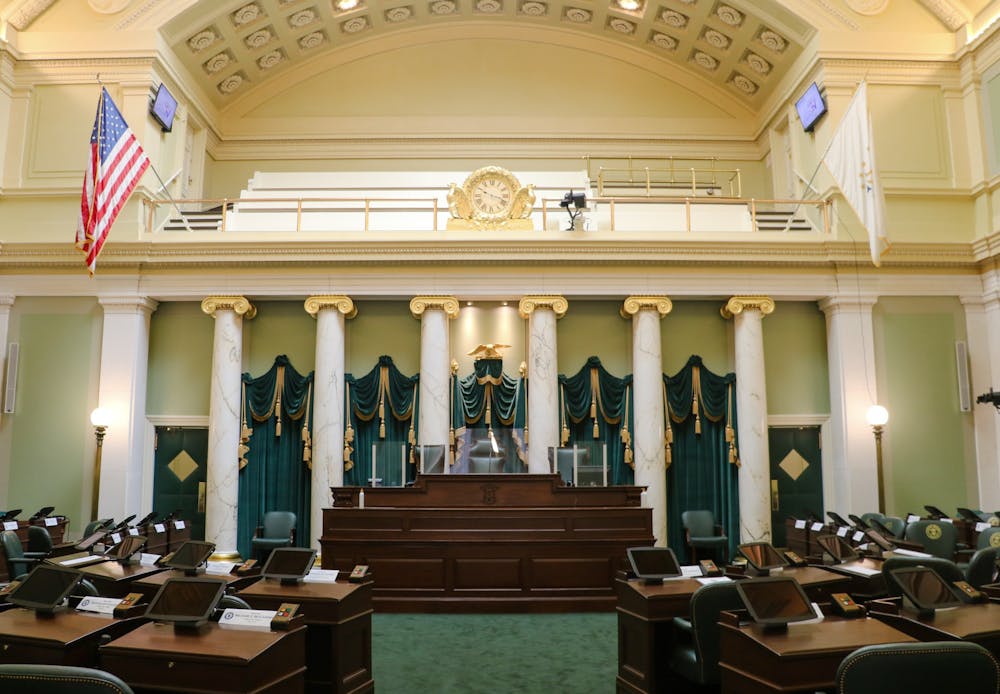Governor Dan McKee’s budget proposal for fiscal year 2023 includes over $150 million in funding for measures intended to fight climate change and further develop the state’s green economy, according to a Jan. 19 press release. The funding will go towards initiatives such as installing electric heat pumps, funding the implementation of the Act on Climate legislation and facilitating the creation of wind-generated power infrastructure.
In order to go into effect, the budget will have to be passed by the Rhode Island General Assembly. It is currently under consideration in the State House of Representatives Finance Committee.
“This investment gives Rhode Island a historic opportunity to slash greenhouse gasses, to improve the quality of our air and water, protect greenspace, ensure equitable shoreline access and expand access to affordable and sustainable clean energy solutions,” Alana O’Hare, the Governor’s press secretary, wrote in an email to The Herald.
Proposed measures include a combined $95 million to renovate the Port of Davisville in South Kingston and the South Quay Marine Terminal in East Providence to facilitate the development of offshore wind farms. Extensive offshore wind power development has recently transformed the Ocean State into a national hub for coastal wind energy, The Herald previously reported.
The governor’s budget proposal also includes $37 million for a program that will incentivize households and business owners to install “high-efficiency electric heat pumps, with an emphasis on families in environmental justice communities and community organizations.” It additionally proposes $23 million to build more electric vehicle charging stations and $6 million annually to fund the Executive Climate Change Coordinating Council, which oversees the implementation of last year’s landmark Act on Climate legislation requiring Rhode Island to reach net-zero emissions by the year 2050.
According to O’Hare, the budget proposal was designed not only to “reduce harmful greenhouse gasses and build more resilient communities, but also (to) reinvigorate our economy by creating good paying jobs.”
O’Hare emphasized the importance of taking a combined public and private sector approach to the clean energy transition. “While government must take the lead on climate change,” she wrote, “the private sector has much to contribute to the development and implementation of adaptation solutions, including technical experience and sector-specific experience.”
J. Timmons Roberts, professor of environment and society and sociology, said he would like to see more money go towards transitioning the Ocean State to a clean economy.
“These numbers are much smaller than they appear, and certainly … way below what’s needed,” he wrote in an email to The Herald. “Funding just to retrofit schools in the state to be efficient, healthy and maybe powered by solar would be many times what is in this list.”
He added that it is difficult to evaluate the amount of money required to adequately address Rhode Island’s contribution to the climate crisis. The $150 million proposal, he wrote, “is a number without any benchmark, a point I continue to make at EC4 meetings. When will they develop actual estimates of how much funding would be needed for a truly adequate response by (Rhode Island)?”
Roberts added that funding for EC4 was “welcome” but noted that “the source of the funding is hugely problematic.” The governor’s proposal to fund the EC4 by cutting an energy efficiency incentive has drawn criticism, EcoRI reported last Friday.
Rhode Island State Rep. David Bennett (D-RI 20 District), chairman of the House Environment and Natural Resources Committee, said that he also had hoped to see more money go towards climate action but called the proposal “a step.”
“We have a long way to go to fix our environment,” he said, “but every little bit helps.”
Bennett, a sponsor of the Act on Climate legislation, also said he believes funding EC4 will positively affect the implementation of the law.
“We need the money. We need to change the way we do things,” he said. “The climate change, the pollution, … all this stuff needs to be handled now. We can’t keep kicking that can down the road.”





